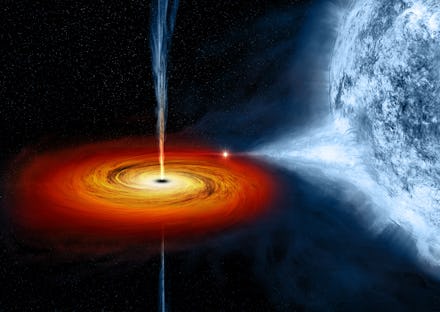What Would Happen if You Fell Into a Black Hole?

Skydiving, bungee jumping and hang gliding are so old-hat. So you, the ultimate thrill-seeker, have decided to throw caution to the solar wind and jump into a black hole.
Black holes are points in space with so much mass and gravitational pull that even light isn't fast enough to escape them. So once you go in, there's no coming out. For some reason, though, you've decided to try your luck. No judgment here! It worked for Matthew McConaughey in Interstellar.
So what would actually happen?
As you start falling into a black hole, you'd just feel weightless, like an astronaut zooming around the International Space Station.
But as you get closer to the center, the gravitational pull of the black hole would start doing strange things to your body.
Suppose you were feeling especially reckless and decided to dive head-first into the black hole. Gravity would start tugging on your head and stretch it out.
At first it would feel like a nice deep stretch, or a little bit of "cosmic yoga," as Neil deGrasse Tyson put it. But eventually your whole body would get stretched out and your sides would get squished in. You'd be "spaghettified," ripped apart and turned into a stream of atoms funneling into the black hole.
Your friends floating outside the black hole would scream in horror at your grisly fate.
OK, so let's say you picked a really, really big black hole — like, billions-of-times-the-mass-of-the-sun kind of big. Your fate might be a little different. Physics gets a little fuzzy with supermassive black holes, and scientists aren't really sure what would happen if you jumped into one.
One theory is that the black hole's point of no return, called the "event horizon," is actually a massive firewall and you'd get incinerated as soon as you hit it.
But there's another theory. In this case, your friends might not even be able to watch you hit the event horizon. To them you'd just get dimmer and dimmer as you got sucked into the black hole, and eventually you'd fade to black (cue Metallica).
What's more, you might actually survive moving past the event horizon of a supermassive black hole — because their tidal force isn't as extreme as smaller black holes. That means there's less of that "spaghettification" stretching.
As you continue to fall, you'd speed up and time would slow down. This concept is called time dilation; it means you'd get to see some crazy things as you slip past the event horizon and keep falling into the center of the black hole.
Charles Liu, an astrophysicist at the American Museum of Natural History, explained it to LiveScience:
If you're able to look forward toward the black hole, you see every object that has fallen into it in the past. And then if you look backward, you'll be able to see everything that will ever fall into the black hole behind you. So the upshot is, you'll get to see the entire history of that spot in the universe simultaneously from the Big Bang all the way into the distant future.
Sounds awesome, right? Sorry, you're still screwed. Eventually you'd reach the black hole's singularity — a point where the curving of space-time becomes infinite — and get crushed.
Whether you get vaporized or live long enough to see the inside of a supermassive black hole is part of the "black hole information paradox," and physicists are actively trying to unravel it.
In the meantime, we'd advise against diving into a black hole. Maybe try something less risky, like base jumping. (Although that's probably a bad idea too.)